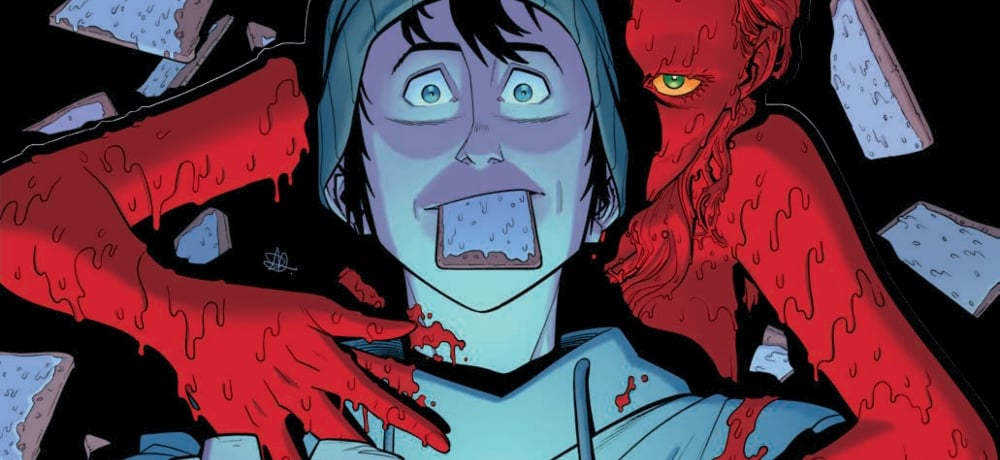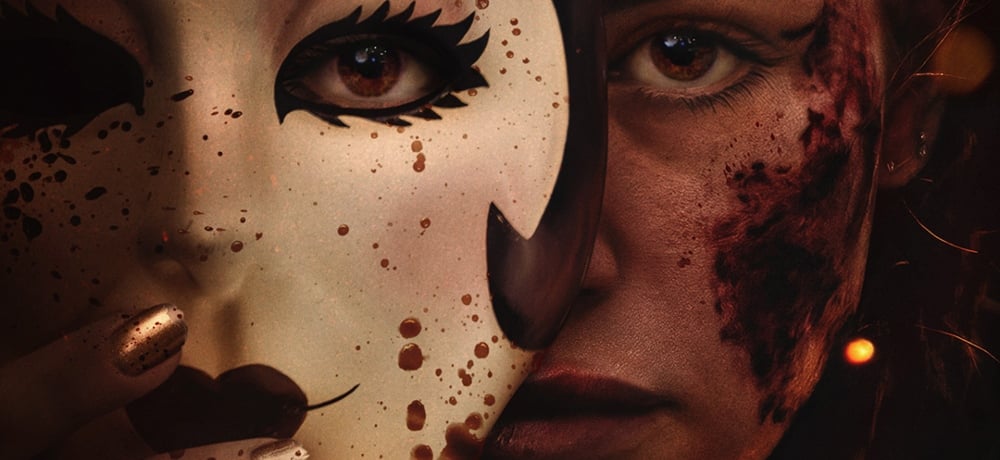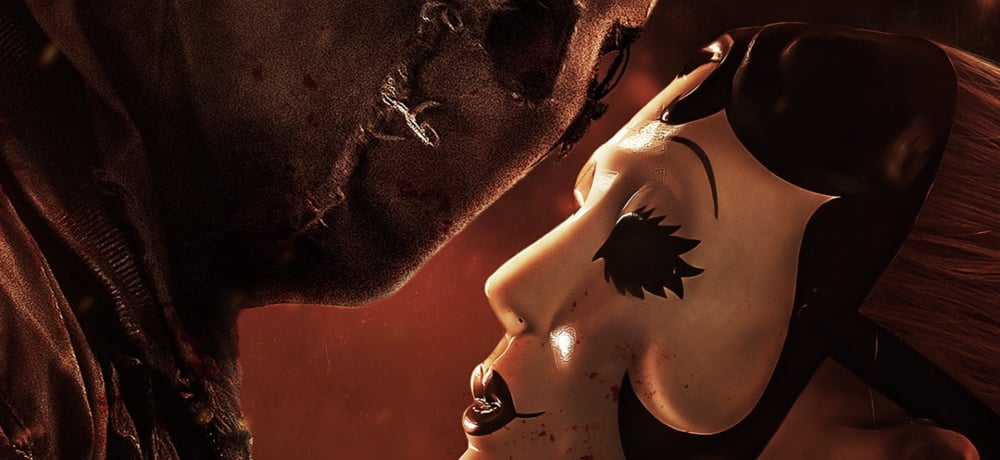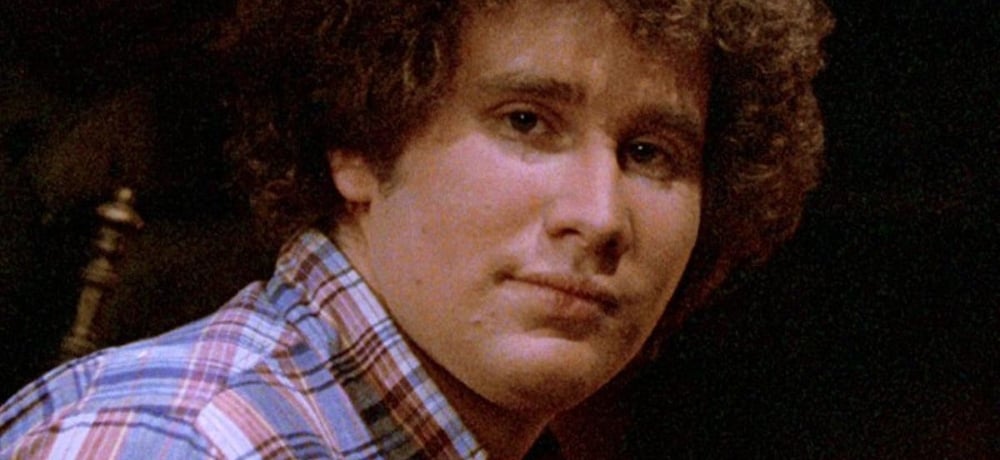






If you’re a fan of the Friday the 13th franchise, even if you don’t know Larry Zerner by name, you very likely know his face. As Shelly, the insecure and overly theatrical member of the group of teens in the series’ third installment, Zerner has the distinction of being the one to unknowingly provide Jason with the mask that would help make him an icon. But as someone who grew up with his own insecurity issues, I always identified with Shelly’s difficulty navigating social interaction, and I appreciate Zerner’s ability to convey that lack of self-worth that manifests itself as just being obnoxious.
What’s been particularly interesting is seeing how Zerner’s career evolved post-Friday the 13th. While his turn as Shelly may not have led to steady work in the industry, Zerner has hung on to his affinity for Crystal Lake even as his career pivoted to entertainment law. His expertise in law combined with his continued interest in the Friday the 13th franchise has made him the go-to guy to help us make sense of the current lawsuit around the franchise between Victor Miller and Sean Cunningham.
I was lucky to get a chance to catch up with Zerner, as he took some time to discuss life as a Los Angeles native, getting into acting as a kid, and his journey into entertainment law. He also gave some insight into the latest Friday the 13th lawsuit and why we’re not likely to see many similar lawsuits in the future.
It’s interesting that you were born in L.A., because usually the story you hear for most people is that they actively move there. What’s it like being someone who was born and raised in the city?
Larry Zerner: It’s hard to describe. It's like asking a fish to describe water. It’s home. Showbiz is just a part of life here. You grow up, you know people who are somewhat associated with show business or people who work in the industry. It’s not a thing, like, “Oh, that’s so surprising.” Although no one in my family was in show business, but it's a thing here, so it's a little easier. I had an agent in high school because agents are here and they come and say, “Okay, I’ll represent you,” so that’s a thing. I mean, I went to high school with the Red Hot Chili Peppers. They were a class above me. My mom went to high school with Lana Turner and Jason Robards. She was at Hollywood High. That's life in L.A.
I went to Fairfax. I guess people go, “I went to school with Larry,” although I don't think everybody thinks I’m that famous. But the Red Hot Chili Peppers were there above me, Slash was two years below me. Byron Allen was in my drama class, later David Arquette went to Fairfax, Mila Kunis went to Fairfax, Herb Alpert, Ricardo Montalban...
The places tourists go are just places you ride by on your bike. The people who shop at the mall [in Pennsylvania] where they shot Dawn of the Dead don’t go, “Oh my God, it's the mall where they shot Dawn of the Dead!” But if I was there, I'd be like “Oh shit, it’s the mall where they shot Dawn of the Dead!”
Were you a horror fan before getting involved with Friday the 13th? What kind of films were you into?
Larry Zerner: I remember when I was a kid, when I was like 10 or 11, I went through a classic Universal Monster phase. I remember telling my parents when I was 10 or 11, “I want to have black wallpaper and just put monsters on it.” And they were like, “No. You can't do that.” I don't remember always watching the movies, because you couldn't watch the movies over and over. You couldn't. I'm one of those oldie old persons where VCRs didn't come out until I was in my late teens, so you watched a movie when it showed up on television. The idea that people growing up now, where you can literally watch any movie you ever wanted when you want, you can listen to any song you want whenever you want, you can read any book you want whenever you want... it's stunning. Back then you watched what showed up and they didn’t show up that often.
Also, there was no watching like The Texas Chain Saw Massacre, that didn’t show up on television ever. I mean, I guess there were some cable companies, maybe there were some that would show it, eventually. Kids today, they see everything. Their parents will show them all the Friday the 13ths, uncut, whatever. They're all going to grow up warped. Kids reading this: you’re all warped... but in a good way!
What got you interested in acting?
Larry Zerner: When I was 11 at my elementary school, every year the 6th graders did a show. The show was H.M.S. Pinafore, which if you don't know is a musical by [W.S.] Gilbert and [Arthur] Sullivan from [1878]. And I was cast as Dick Deadeye, who is the villain, and he has a patch on his eye, he has like a palsied hand, and he gets to be the bad guy. That was it! I remember I got on stage the first night, I was kind of a kid who wanted attention. And then I got on stage and it was like, “Oh yes! Attention! There it is, yes, it's coming to me. Alright, I love it! Oh yes, a little ‘acting crack,’ give me some more of that. I love it.”
The story for how you were discovered for the role of Shelly is that they spotted you handing out tickets for The Road Warrior. What was life like for an aspiring actor in the early ’80s?
Larry Zerner: I was in school. I was a freshman in college studying theater, so that was my day. I was at school like any college freshman. To make money, I had this job handing out movie tickets for sneak previews. This is something that's a very L.A. job, handing out tickets to sneak previews. It was an okay job because you got to set your own hours. You're not hurting anybody, just saying, “You want to go see a movie? Here!” People like it. I'm not trying to sell somebody anything, it's all right. It was like a minimum wage job and sometimes you got to see the movies.
I'd done a few auditions. Keep in mind you can't really do anything until you're 18. I turned 18 in September of 1981, and [getting the role of Shelly] happened in January of 1982. This is four months into my 18th year, so it happened fairly quick.
Did you get recognized as Shelly after the film was released? If so, what was the reaction you got from people?
Larry Zerner: Oh yeah, so the movie came out and it was a hit. It was number one for two weeks in a row, and I looked exactly the same. And Shelly is fairly unique looking, he doesn't blend in with the crowd. I immediately had a certain level of recognition. People didn't know my name, but people knew Shelly. So there was a month or two where I would go out and you would hear, “Oh that’s Shelly! There he is, that’s Shelly!” And sometimes people came up to me, so I got a little touch of it. There were no paparazzi chasing me or anything like that. I remember going to Six Flags Magic Mountain a few weeks after the movie came out with some friends, and I just walked down the line of people and you can hear behind you “That Shelly!” It's just fun, and for a while it’s every day, and then it's every other day, and then it's once a week, once a month. Now it's pretty much once a year someone will recognize me when I'm not at a convention or something horror-related.
What drew you to entertainment law? Was it a general interest in the field?
Larry Zerner: No [laughs]. Basically, my dad was a lawyer. I had no desire to be a lawyer. I was like, “I'm not going to be a lawyer, I don't want to do that.” And then I graduated from school. I didn't really have... after Friday the 13th, there weren't really parts coming. It didn't lead to a TV series or anything. I wasn't really making any money, and my dad said that he would pay for law school. I said, “Well, it will buy three years. I don't know what I'm doing, but it'll buy me three years.” And that was it. It turned out I took the LSAT, I scored in the top 2% on the LSAT. I have a good brain for that kind of thing, I did really well in law school, and turns out I have good aptitude. I'm a good lawyer. I'm a much better lawyer than I am an actor. Not that I'm a bad actor, but I'm a better lawyer.
The Friday the 13th lawsuit has been ongoing for quite some time [writer’s note: writer Victor Miller is trying to reclaim rights to the property after the standard 35-year period, but director/producer Sean Cunningham is arguing that Miller created the franchise under his employ and therefore never had the rights to it. Miller won the initial case, but Cunningham has appealed the decision]. Do you think there’s a party clearly in the right here, or is it more shades of gray?
Larry Zerner: I would say Victor has the better argument and that's why he won at the lower court. And not just won, he won it in summary judgment [writer’s note: this means the judge found it clear-cut enough that they didn’t see a need to go to jury]. The judge thought there were no issues of fact. In deciding whether or not Victor is an employee of Sean's, you look at basic employment issues. Did the employer hire by the hour or by the day in the project, or is it ongoing? Does the employer provide a place to work? Does the employer provide tools? Does the employer withhold taxes? How much control does the employer have over the employee? And in Victor's case, the argument was: not much. Victor worked at home. He wrote when he wanted to. He was only hired to write this one thing. It was a set fee, they didn't deduct any taxes from his paycheck. So that's much more like an independent contractor.
Sean was arguing that he was there with him, that they worked together, that he was telling them what to do as they went along. That's an argument that may get the court to go, “Well, we may need a jury to decide this.” Hopefully they do not, because if they do it means it's probably going to be another couple of years before the courts are over. I predicted from the beginning that Victor would win, and he has. And when the appellate court eventually comes out with their decision... but who knows when that is.
What do you think separates the Friday the 13th lawsuit from the similar lawsuit between Clive Barker and Park Avenue Entertainment over the rights to Hellraiser, which settled almost immediately?
Larry Zerner: One is that Clive wrote a book, so certainly when he sold the rights to Hellraiser, they weren't employing him. It was hard to argue that he was their employee when he had already written the book and he transferred the rights of the book to them. Also, Clive Barker is Clive Barker, and he has a lot more clout. And I'm sure the facts were a lot more... I mean the facts were good in Victor's case, but also, they were already in the process of doing the new Clive Barker show, the new Hellraiser show. And I don't know how much of a fight there really was. I think they wrote a letter to him. Like in this case, as opposed to Victor and Sean, Clive sued for a declaration, saying that they could not transfer it, and they sort of caved on that. I think they had sent a letter threatening to make some claim, and Clive went first and said, “I'm going to sue you, and you prove it.” They said “We don't have any facts. We back down.”
Do you think we are going to see more of these types of lawsuits pop up in the future?
Larry Zerner: I don't. I think this is a really unusual situation. The problem was if you had in the contract that it's a work for hire, then it's a work for hire. It doesn't matter, anything else. Sean didn't have that in his contract. Why didn't he have it in his contract? Because he was using the old WGA contract. Why was he using the old WGA contract? Because that was a contract that had been in use. They only changed the law in 1978, and I think this was in 1979 that the deal was made. So he just hadn't gotten a new contract. It's not like you could have gone online and downloaded it. Very quickly people learned, “Oh no, we've got to have this work for hire language in.” Every contract has the work for hire language in it, so I don't think you're going to have any more of these situations. You might have a few, but it's going to be very rare. Almost every contract has the work for hire language in it now.
If you use the magic words “this is work for hire,” then the employer (in this case Sean) owns it. Even if all the other factors are in Victor's favor, you don't do that analysis if you have the magic words. It's the employer’s.
What advice would you give up and coming filmmakers to protect their work from a legal standpoint?
Larry Zerner: First, if you have a spec script, register it with the copyright office prior to any sale because then when they go, “I want you to sell it as a work for hire,” you can go, “No this is a spec. This is not a work for hire, I already wrote it.” Then you have the power to go, “I already copyrighted it. You can't go ‘this is work for hire,’ it wasn't. I wrote it on spec.” So don't give that away. If you wrote something on spec, that's the reward for writing a script on spec. At least in Victor's case, there's an argument that Sean asked him to write it. They were working on it together and he knew he was going to get paid. But if you write something knowing “I may or may not get paid, I may or may not ever sell it,” it's yours. Do not ever sign anything that says “work for hire.” Make sure you register with the copyright office. Never the WGA. The WGA registry is literally a rip-off that does nothing to protect you.
Be very careful about using a loan out. This is just a really in-the-weeds thing, but if you write and you use a loan-out corp, which a lot of writers do for tax purposes, the issue is that only individuals have the ability to terminate after 35 years. Businesses do not. So, if you wrote it and your loan out wrote it, the loan out cannot terminate. Now, maybe at some point they will fix this in the Copyright Act. They may not, so you have to write it as yourself and then transfer it to your loan out. Then you can terminate that transfer in 35 years.
Are there any other trends in entertainment law that you’ve got your eye on?
Larry Zerner: Yeah, yesterday when they passed the big stimulus bill, they snuck in the copyright small claims court. [Click here for details on the CASE Act]. That's a big deal. I'm very curious as to how it's going to play out. Will it be abused? Will it turn out to be a good thing or a bad thing?
It had nothing to do with the COVID bill, but they had it ready and they just stuck it in. It’s ready to go, the House had already passed it, I guess the Senate, they basically just stuck a bunch of unrelated stuff in there. It's a small claims court. You can sue for $30,000, you're not required to use a lawyer. In fact, you can use a law student. Law students can help and act as counsel. But you can't get attorney’s fees, you're capped at $30,000. So, for a lot of photographers who have minor, smaller cases, those are the people I really see using it more than anyone else. We'll see what happens. It's an opt-in thing. If someone sues you in small claims court, you can opt out. Then they have to see you in regular court, which may or may not be advisable. Sometimes they might not be able to take it into regular court because of certain procedural things, so it's better not to.
Finally, before we go, is there any new horror you are excited about? Have you seen anything lately that stood out?
Larry Zerner: This was a pretty good year. I thought Host was one of the best movies I've seen. It was really good, and I was really impressed. Done in COVID times, talk about making lemonade out of lemons. It was just brilliant, and then an hour long. It was just the perfect length. I like that you can do a movie in an hour. Shudder should buy more one-hour movies. I think sometimes that's better, a lot of them get a little too expanded out. So that was great. I'm looking forward to the new Conjuring [The Conjuring: The Devil Made Me Do It]. Horror is in good shape.